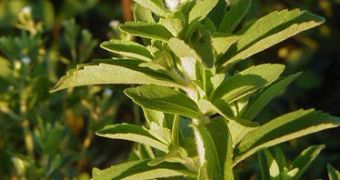Coca-Cola and Cargill have announced that they have developed a new natural sweetener from the sweet grass or honey leaf (Stevia rebaudiana), a South American bush whose leaves are used by Guarani Indians (Paraguay and Southern Brazil) for centuries as sweetener in mate beverage. The plant is highly popular in Paraguay and Brazil.
Standard sweeteners like aspartame and sucralose can induce the sweet tastes in the tongue but they are artificial chemicals.
The new zero-calorie sweetener are in fact two glycosides (stevioside and rebaudioside) synthesized by the sweet grass. These chemicals are 250-300 times sweeter than sugar, heat stable, acidity stable and non-fermentable.
"This has been a closely held secret for a while," said Zanna McFerson, business director for Cargill Sweetness Solutions, the division that handles the company's roughly 20 sweeteners.
The new sweeteners will be added to the beverages in one year at the soonest in countries like Japan, where they are already widely used as tabletop sweetener for over 30 years. Japan is the biggest cultivator and consumer of sweet grass as an alternative to artificial sweeteners but the plant is also cultivated in China, Korea, Taiwan, Thailand, Malaysia and Israel (outside South America).
The new sweeteners come as a natural alternative and a relief from increased costs of high fructose corn syrup. Still, in US, there is a vivid debate around this plant.
The sweet grass and its sweeteners did not receive approval from Food and Drug Administration, and till 1995 there was an import ban, and stevioside and rebaudoside can be used just as a dietary supplement, not a food additive.
"Available toxicological information on stevia is inadequate to demonstrate its safety as a food additive or to affirm its status as safe".
The concerns started in 1985, when the plant was linked to possible liver damage and steviol, a breakdown product from stevioside and rebaudioside, was pointed as mutagen but this is disputed and human clinic results do not enhance this. Other researches have linked it to infertility in men.
World Health Organization asks for more researches to determine the acceptable daily intake of sweet grass. Yet the plant has many supporters in the dietary supplement industry who blame its reputation in bad science. The company wants to realize peer-reviewed studies to show that the plant is not toxic.

 14 DAY TRIAL //
14 DAY TRIAL //